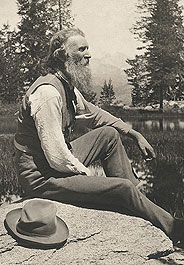
I've immensely enjoyed watching the first three parts of the Ken Burns six-part series on the history of America's national parks--The National Parks: America's Best Idea. My thoughts have been drawn not just to the parks themselves, but also the foresighted people who dared to believe in the concept and pushed successfully for them.
Spanning the nation--from Acadia to Everglades to Joshua Tree to Rainier to Denali--the protection of these lands, and the animals and plants that live on them, reflects the triumph of new values: nature is wondrous, all life deserves protection, and our treks to these gems of Creation are a tonic to the soul. It took leadership to make it happen, and eventually the rest of the public recognized the idea as right and important and rehabilitative.

It must have seemed heretical in the earliest days to many observers to set aside these lands, especially during a period when Americans took such a ruthlessly extractive view toward nature. In the second half of the 19th century, when Yellowstone was set aside as the world's first national park, individuals, corporations, and the federal government were liquidating forests and slaughtering wildlife. The idea of protecting millions of acres and shielding them from exploitation was novel and threatening, but its advocates confronted these arguments and won many battles over the decades. Now, thanks to their efforts, we have 80 million acres of lands protected by the National Park Service--and they are part of what makes our nation great. The idea has also provided inspiration to the world, and now dozens of countries have established their own national park systems, compounding the benefit of the original idea.
Our movement for the humane treatment of animals started about the same time, and it, too, must have seemed heretical. Now, like the movement to have the federal government take charge of lands and protect them, some aspects of our cause are widely embraced, such as the idea of preventing people from engaging in staged fighting or perpetrating acts of malicious cruelty to animals. But some of our other ideas, like halting the factory farming of animals for food or phasing out the use of animals in animal testing, still challenge the imagination of some. As in the early days of the creation of the first parks, we see lawmakers in Congress, corporate leaders, and many other individuals stand in our way and defend the idea that animals are just things or that their own economic self-interest trumps the interest of animals to be spared suffering and pain.
But over time, I am confident that most of the people who stand in the way of moral progress will be forgotten, just like most of the individuals who stood in the way of John Muir and Stephen Mather in their pioneering moral campaign to create parks. We will instead remember and revere the risk takers and the people who dared to believe in a world where humans were not the only creatures who mattered.
Very few sweeping reform efforts ever came easily, and few are static and do not require continued work and perseverance even after the core ideal is widely accepted. Today, threats to national parks are many. In terms of our efforts to realign the human relationship with animals, that cause will continue to gather steam if good people continue to stand up for these ideals. But don't leave it to anyone else. Stand and be counted now. And remember that every social reformer has had to stand tall in the face of the countervailing winds of his or her time.
This post originally appeared on Pacelle's blog, A Humane Nation.
